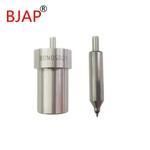Information injection-pump assembly
BOSCH
9 400 616 462
9400616462
ZEXEL
104303-3250
1043033250
TOYO-SHA
62715101011
62715101011
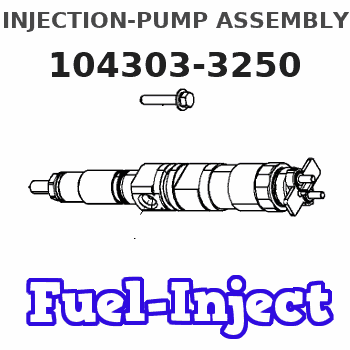
Rating:
Service parts 104303-3250 INJECTION-PUMP ASSEMBLY:
1.
_
3.
GOVERNOR
4.
SUPPLY PUMP
5.
AUTOM. ADVANCE MECHANIS
6.
COUPLING PLATE
7.
COUPLING PLATE
8.
_
9.
_
11.
Nozzle and Holder
12.
Open Pre:MPa(Kqf/cm2)
11.8{120}
15.
NOZZLE SET
Include in #1:
104303-3250
as INJECTION-PUMP ASSEMBLY
Cross reference number
BOSCH
9 400 616 462
9400616462
ZEXEL
104303-3250
1043033250
TOYO-SHA
62715101011
62715101011
Zexel num
Bosch num
Firm num
Name
104303-3250
9 400 616 462
62715101011 TOYO-SHA
INJECTION-PUMP ASSEMBLY
3S150 K
3S150 K
Calibration Data:
Adjustment conditions
Test oil
1404 Test oil ISO4113 or {SAEJ967d}
1404 Test oil ISO4113 or {SAEJ967d}
Test oil temperature
degC
40
40
45
Nozzle and nozzle holder
105780-8140
Bosch type code
EF8511/9A
Nozzle
105780-0000
Bosch type code
DN12SD12T
Nozzle holder
105780-2080
Bosch type code
EF8511/9
Opening pressure
MPa
17.2
Opening pressure
kgf/cm2
175
Injection pipe
Outer diameter - inner diameter - length (mm) mm 6-2-600
Outer diameter - inner diameter - length (mm) mm 6-2-600
Tester oil delivery pressure
kPa
157
157
157
Tester oil delivery pressure
kgf/cm2
1.6
1.6
1.6
Direction of rotation (viewed from drive side)
Right R
Right R
Injection timing adjustment
Direction of rotation (viewed from drive side)
Right R
Right R
Injection order
1-3-2
Pre-stroke
mm
2.2
2.15
2.25
Rack position
After adjusting injection quantity. R=A
After adjusting injection quantity. R=A
Beginning of injection position
Drive side NO.1
Drive side NO.1
Difference between angles 1
Cal 1-3 deg. 120 119.5 120.5
Cal 1-3 deg. 120 119.5 120.5
Difference between angles 2
Cyl.1-2 deg. 240 239.5 240.5
Cyl.1-2 deg. 240 239.5 240.5
Injection quantity adjustment
Adjusting point
A
Rack position
10
Pump speed
r/min
800
800
800
Average injection quantity
mm3/st.
37.5
36.5
38.5
Max. variation between cylinders
%
0
-4
4
Fixing the lever
*
Injection quantity adjustment_02
Adjusting point
B
Rack position
9.5
Pump speed
r/min
1250
1250
1250
Average injection quantity
mm3/st.
35.5
34.5
36.5
Max. variation between cylinders
%
0
-3
3
Basic
*
Fixing the lever
*
Injection quantity adjustment_03
Adjusting point
C
Rack position
9.9
Pump speed
r/min
900
900
900
Average injection quantity
mm3/st.
36
35
37
Max. variation between cylinders
%
0
-4
4
Fixing the lever
*
Injection quantity adjustment_04
Adjusting point
D
Rack position
8.6+-0.5
Pump speed
r/min
375
375
375
Average injection quantity
mm3/st.
11
10
12
Max. variation between cylinders
%
0
-14
14
Fixing the lever
*
Test data Ex:
Governor adjustment
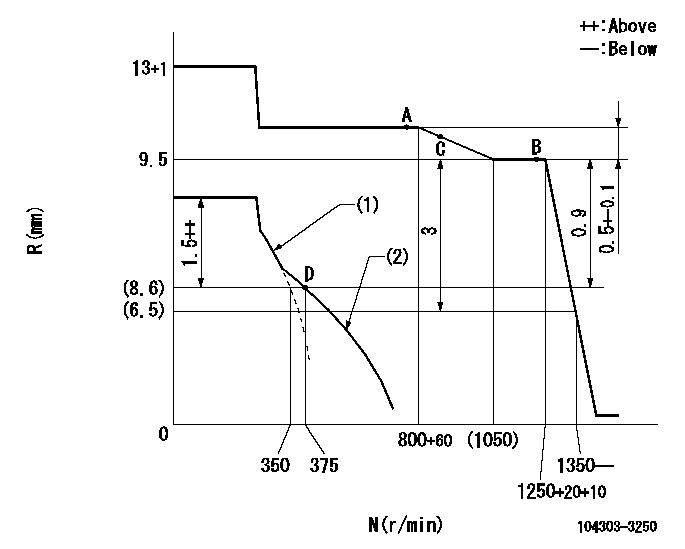
N:Pump speed
R:Rack position (mm)
(1)Set the idle spring.
(2)Main spring setting
----------
----------
----------
----------
Speed control lever angle

F:Full speed
I:Idle
----------
----------
a=16deg+-3deg b=31deg+-6deg
----------
----------
a=16deg+-3deg b=31deg+-6deg
Stop lever angle
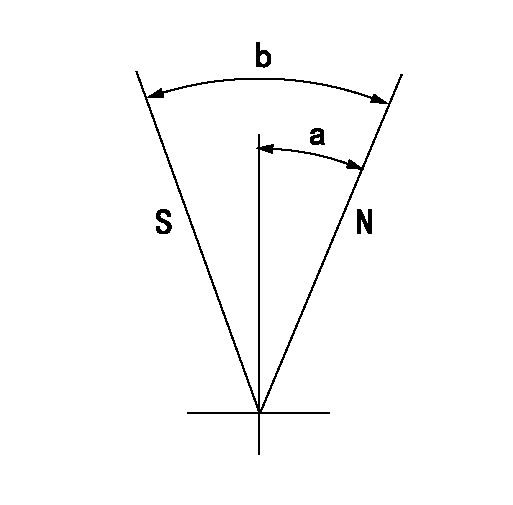
N:Pump normal
S:Stop the pump.
----------
----------
a=18deg+-3deg b=(38deg)
----------
----------
a=18deg+-3deg b=(38deg)
Timing setting
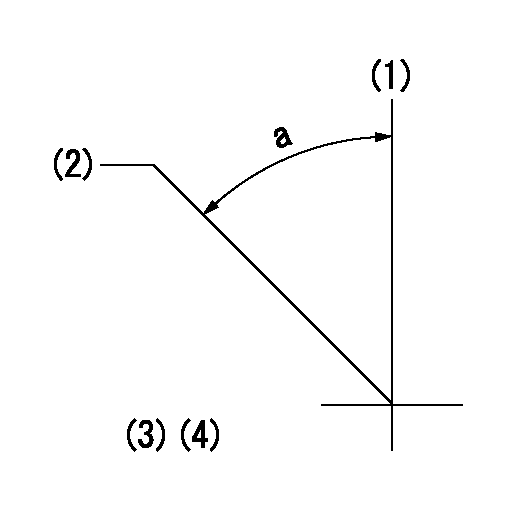
(1)Pump vertical direction
(2)Position of camshaft's key groove at No 1 cylinder's beginning of injection (at full load)
(3)-
(4)-
----------
----------
a=(40deg)
----------
----------
a=(40deg)
Information:
1. Poor Quality Fuel If poor or low quality fuel is suspected, use a source of known good quality fuel, prime and start the engine. If the problem is resolved, drain the complete fuel system, replace the fuel filter, and add fuel recommended by Caterpillar.2. Low Fuel Pressure Measure the fuel transfer pump pressure at rated engine rpm. The 1U5470 Engine Pressure Group can be used to measure the fuel transfer pump pressure. The 1U5470 Engine Pressure Group has a gauge to read fuel pressure to the fuel supply manifold. Special Instruction, Form No. SEHS8907 is with the tool group and gives information for its use. The ECAP or the DDT can also be used to check the fuel transfer pump pressure.If the fuel transfer pump pressure is below 445 kPa (65 psi) at rated rpm, check for: * Restrictions in the low pressure fuel system (plugged fuel filter, collapsed hoses, etc).* Air in the fuel.* Fuel transfer pump wear or damage. Refer to Specifications, 3176 Vehicular Diesel Engine, Form No. SENR4965.* Excessive fuel return to the tank due to a malfunction of the fuel pressure regulating valve in the siphon block.3. Air In Fuel System Disconnect the fuel return line at the tank. Place this end of the line in a container of fuel to see if air bubbles are present while the engine is running. If air bubbles are observed, check for loose fittings or line leaks between the fuel tank and the fuel transfer pump. If leaks are found, tighten the connections or replace the line(s).To remove air from the engine fuel system: With the engine off, loosen the fuel return line fitting at the fuel manifold. Operate the fuel priming pump until the flow of fuel is free of air. Tighten the return line fitting, fasten the priming pump, and start the engine. If the engine still does not run smooth or produces a lot of white smoke, apply 35 kPa (5 psi) of air pressure to the fuel tank to force fuel through the system.
Do not use more than 55 kPa (8 psi) of air pressure in the fuel tank or damage to the tank may result.
Check the fuel return line for restriction. Replace if it is plugged.4. Injector Not Seated Properly Leakage due to a loose injector or inadequate injector/sleeve sealing can cause combustion gas to enter the fuel supply manifold. Inspect and repair as necessary the sealing surface (seat) of the injector sleeve. The injector sealing surface (seat) must be free of scratches or evidence of a combustion leak (carbon). If it is necessary to rework (ream) or replace the sleeve use 4C4054 Tool Group and refer to Special Instruction, Form No. SEHS9246, Using The 4C4054 Unit Injector Sleeve Replacement Tool Group. Torque the fuel injector hold down bolt to 30 7 N m (22 5 lb ft).5. Defective Unit Injectors A defective unit injector can be found using the Electronic Control Analyzer and Programmer (ECAP) and the
Do not use more than 55 kPa (8 psi) of air pressure in the fuel tank or damage to the tank may result.
Check the fuel return line for restriction. Replace if it is plugged.4. Injector Not Seated Properly Leakage due to a loose injector or inadequate injector/sleeve sealing can cause combustion gas to enter the fuel supply manifold. Inspect and repair as necessary the sealing surface (seat) of the injector sleeve. The injector sealing surface (seat) must be free of scratches or evidence of a combustion leak (carbon). If it is necessary to rework (ream) or replace the sleeve use 4C4054 Tool Group and refer to Special Instruction, Form No. SEHS9246, Using The 4C4054 Unit Injector Sleeve Replacement Tool Group. Torque the fuel injector hold down bolt to 30 7 N m (22 5 lb ft).5. Defective Unit Injectors A defective unit injector can be found using the Electronic Control Analyzer and Programmer (ECAP) and the
Have questions with 104303-3250?
Group cross 104303-3250 ZEXEL
Ishikawajima-S
Toyo-Sha
Nissan-Diesel
Toyo-Sha
104303-3250
9 400 616 462
62715101011
INJECTION-PUMP ASSEMBLY
3S150
3S150
